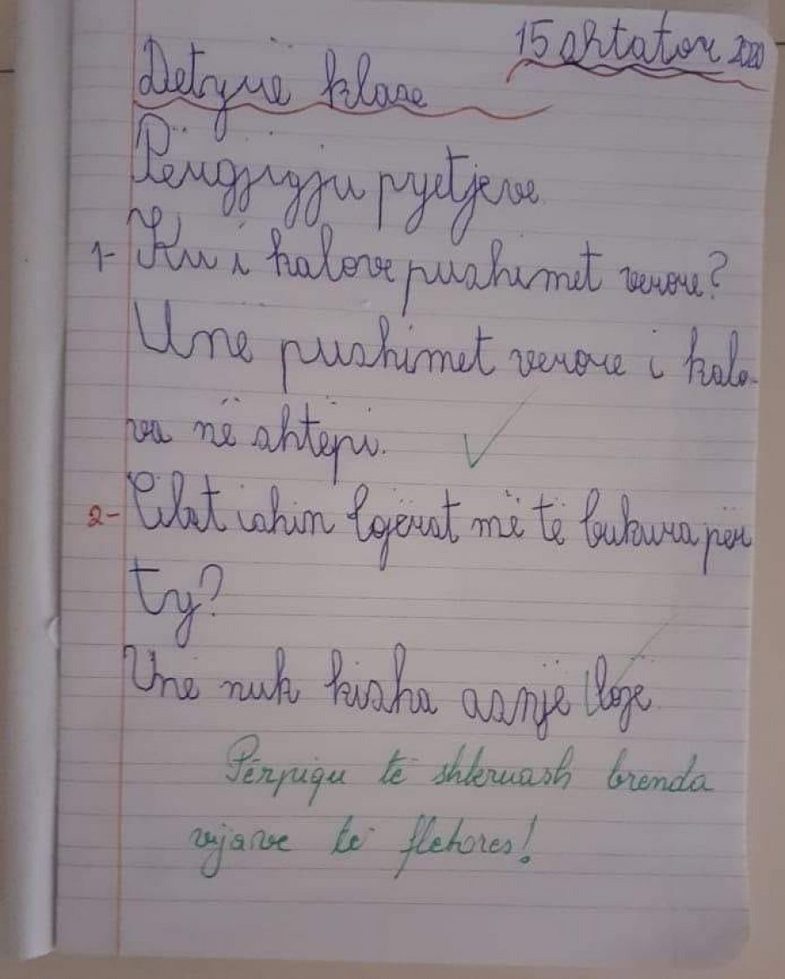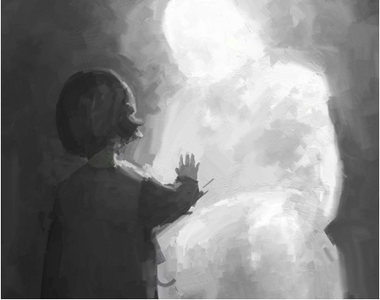
On September 15, one day after school started, some elementary school students were asked, always taking it for granted that it really happened, to answer two questions about class assignments: “Where did you spend your summer vacation? " and "What were the best games for you?" There is something wrong with the first question that is worth discussing, however the discussion of the debate on social media focused elsewhere: The teacher's reaction.
As you can see, the student's answers are "I spent the summer holidays at home" and "I had no games". The teacher on the other hand writes: "Try to write inside the lines of the notebook!". There were many people who described the teacher as "heartless", that she should "react", that "she responded very coldly to the child", etc. To understand that the whole debate is boiling on the wrong side, I am presenting a section for each discussion topic below.
THERE IS A CURRICULUM - THERE ARE SOME COMPETENCES
The teaching curriculum is built on the basis of competencies. So each subject has its own competencies referring to specific classes. In this case, through writing, the main objective is to test students' spelling and grammar knowledge as well as to develop their expressive skills. The teacher's note is more than correct, as long as she has pointed out to the student to write within the lines of the notebook.
THE TEACHER READ BETWEEN THE LETTERS. CLEARLY, THEN?
Of course teachers are not just curriculum implementers, but they build (or at least should build) an emotional relationship with students and referring to what is written in many online reviews, this teacher should have reacted differently. Agree, but the question arises: In what way? What is the teacher supposed to write in the notebook to the student?
EMPATHY, WITHOUT KNOWING WHAT
There seems to be a tendency to dramatize with or without consciousness any similar situation and to place it in a background, for which we should definitely feel sorry. Being empathetic is a feeling that naturally arises when you are inside the event, or at least know enough details about the event. What do we know about this case? Very little.
Në asnjë pjesë nuk kuptojmë se nxënësi është i trishtuar për faktin që i kaloi pushimet e verës në shtëpi. Ndoshta ai është shumë i lumtur, po themi, që më fund, duke qenë se i urren udhëtimet dhe ndërkohë prindërit i ngecën në Agra ku po vizitonin Taj Mahal pak para se të mbylleshin kufijtë në Indi, qëndroi me gjyshen në shtëpi. Kjo e gjitha është një supozim, patjetër, megjithatë detyra e mësipërme ka shumë skenarë të mundshëm. Një tjetër skendar është edhe tendenca e fëmijëve për t’i rënë shkurt gjërave sepse është e kuptueshme, ndonjëherë përtojnë të shkruajnë.
PËR ÇFARË DUHET TË FLASIM, POR S’PO FLASIM
Në gjithë këtë histori, siç e thashë më sipër, debati po ndodh në anën e gabuar, pra reagimi i mësueses dhe jo te vetë pyetja, e cila ndoshta nuk duhet të jetë më pjesë e kurrikulave mësimore, të paktën jo në këtë formë. “Çfarë bëre gjatë verës?” do të ishte një pyetje shumë herë më e përshtatshme sesa “Ku i kalove pushimet verore?” pasi jo pak familje, për arsye të ndryshme, nuk i kalojnë pushimet verore diku. Pyetja mund të vendosë në pozita inferioriteti fëmijët dhe një dukuri e tillë ndodh edhe për situata të tjera, për sa kohë formulimi i pyetjeve nuk është gjithëpërfshirës. Një tjetër shembull ilustrues janë detyrat ku nxënësve u kërkohet të përshkruajnë mamin dhe ta vizatojnë atë. Detyra nuk duket problematike, deri në momentin që duhet të kryet nga një nxënës që nuk e ka mamin dhe ndoshta nuk e ka parë kurrë.
Teaching and its techniques should be constantly updated in order to avoid the position of inferiority which I mentioned above, as long as education should be inclusive and not exclude with such similar questions children with socio-economic problems, children with family problems, children with one parent or those with different abilities.







